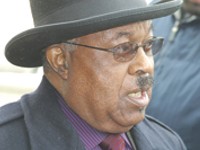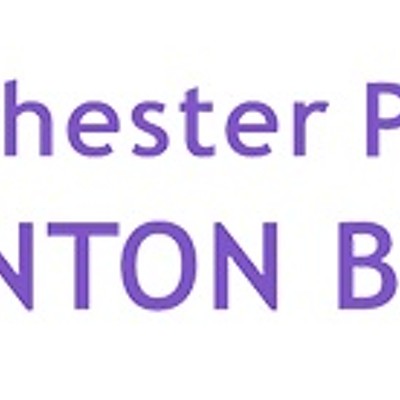News Briefs 6.11.03
[
{
"name": "500x250 Ad",
"insertPoint": "5",
"component": "15667920",
"parentWrapperClass": "",
"requiredCountToDisplay": "1"
}
]
National Forest watch
To walk the Finger Lakes National Forest --- a 16,000-acre complex of federal lands near Trumansburg --- is to love it. But there are, as they say, competing interests for this forest's attentions.
On June 5, the US Forest Service, which oversees the FLNF, held a public meeting to discuss possible revisions to the official Forest Plan. The plan must be updated every 15 years, says Forest Service staffer Mike Dockry, the designated FLNF planner. The meeting, he says, focused on "goals and visions" for the FLNF trail system.
"Right now, we're sort of talking in general" about proper trail uses, says Dockry. The trails, he says, now accommodate hikers, horseback riders, cross-country skiers, and (in places) mountain bikers. "Some people would like to see ATV access," he adds. Right now, he says, ATVs and other motorized vehicles are not allowed on FLNF trails.
ATVs do encroach on the national forest, though, says Dockry. The rules against such use, he says, are difficult to enforce, and "user conflicts" are not unknown.
Some conflicts between different "user groups" arise even at the public meetings, apparently. Dockry says the Forest Service has brought in mediators from "Interface," a project run by an Ithaca-based dispute resolution center, to help all sides with "practical listening techniques."
Dockry says a follow-up public meeting is scheduled for Tuesday, July 1, from 7 to 9 p.m., at the Hector Volunteer Fire Hall, Route 414, in Hector.
There also will be two informal trail hikes --- a peerless way to see the issues in the real world --- on Thursday, June 16, and Saturday, July 19, 9 a.m. to 1 p.m. both days. Hikers will meet, Dockry says, in the FLNF's "Blueberry Patch" parking lot.
(For maps and other information, call Dockry at 607-546-4470 x316; or visit www.fs.fed.us/r9/gmfl and follow links to the relevant planning documents.)
Greener pastures
It's been a great summer so far for the Green Party of New York State and local Green city school board candidate Dave Atias.
On May 30, a US District Court judge ruled that the party can continue to enroll voters and that the Green Party name will remain printed on voter registration forms. The Greens had to fight for these political rights in court due to state election laws which, they say, have been crafted by the two major parties to make it harder for upstart third parties to challenge their dysfunctional stranglehold on state politics.
If a party's candidate for governor fails to get 50,000 votes, state and county election officials are directed to take actions that effectively erase that party from existence. County boards of election go through their lists of registered voters and disenroll anyone enrolled in a party whose candidate failed to get 50,000 lever-pulls. The party's name is no longer printed on voter registration forms or ballots for future elections. Those measures make it much more difficult to party organizers to identify and contact current members, attract new voters, and challenge established party candidates.
Stanley Aronowitz, the Greens' 2002 gubernatorial candidate, fell about 8,000 votes short of the 50,000-vote threshold. The Liberal and Right to Life parties also missed the mark, but Judge John Gleeson's ruling does not apply to them.
Gleeson's ruling bars county election officials from disenrolling Green voters, but does not restore the party's ballot status. As a result, party organizers will have to collect 15,000 signatures from registered voters statewide, and run a candidate in the 2006 state elections who gets over 50,000 votes, in order to regain an official line on the ballot. The party has over 30,000 enrolled voters in New York, 1,400 in Monroe County.
However, Atias' name will appear on an official ballot line come this November's city school board election, because the Working Families Party has given the Green its official endorsement. Working Families endorsed former state comptroller H. Carl McCall for governor last year, and though he also ran on the Democrats' line, over 90,000 voters checked his name on the WFP line.
Atias and his Green supporters must collect about 1,500 signatures to get his name on the ballot as a Green candidate, and Atias intends to do so. So there's the distinct possibility he'll appear on two lines this fall. Votes for Atias on either line would count toward his total.
"It's time that the Greens and the Working Families Party work together," says WFP organizer Alex Monticello. "We certainly have the same objectives." Those include affordable health care, living-wage jobs, and better public schools, he says.
Monticello says his party will announce its endorsements for several other local races in late June. Those will include candidates for county executive and a few "key town races," such as town supervisor races in Chili and Ogden.
Interestingly, Working Families won't be endorsing a candidate for Monroe County District Attorney this year. "We were disappointed to see Scott Green drop out of the race," Monticello says. "We feel he was the best candidate for the job."
Scott Green failed to get the Democrats' endorsement at its convention last month. Instead, the Dems chose Mike Green, the first assistant district attorney under current Dem D.A. Howard Relin, who is retiring. After actively seeking Republican support, Mike Green switched his party affiliation to become the Donkey Party candidate, fueling the charge third parties often level against the two major parties: they're essentially one-in-the-same.
In related news, Domingo Garcia has decided not to run a primary campaign in an attempt to be one of the Democrats' candidates for Rochester City School Board. He cited a disinclination to cause more "dissention" in the party.
Seeds, soil, change
On May 31, one transplanted West Coaster demonstrated she'd rather be here than in Philadelphia, for a night at least. Yael Lehman, head of the Philadelphia Food Trust, was here to speak at the Politics of Food annual dinner. Lehman described her group's main educational project: running a public school-based program in which students learn the art of gardening, harvesting, and marketing vegetables, and handling the cash and bookkeeping, as well.
Jan McDonald, a longtime Politics of Food volunteer who became the group's paid program coordinator just eight weeks ago, says local food-and-justice advocates were buoyed by Lehman's talk and example. "It's helpful to have a model for what we want to do in Rochester," McDonald says. She adds that Politics of Food would like to be active in more city schools. The group now runs a student gardening project at School 9, North Clinton Avenue.
Last season, though, the project suffered a setback. Coca-Cola Inc., with operations next door to School 9, had been providing space for the garden. But swayed by post-9/11 security worries, Coke officials said the land could no longer be used by outside groups, and thus the garden had to go.
But there was a happy ending.
As McDonald explains, School 9 has adopted the gardening project as an official school club, and the gardeners now have the use of some school property. Moreover, Bethany House, a Catholic worker project near the school, has provided some additional land.
The Politics of Food, says McDonald, has two other food-and-gardening programs underway: one with the city parks department, and one with CONEA (Coalition of North East Associations) in the old Sibley's building downtown.
One more angle: The School 9 project, says McDonald, uses "sacred seeds" --- that is, "heirloom" or traditional seed varieties --- grown and marketed by Melissa Jacobs of Nunda, Livingston County.
Flag this vote
On June 3, the US House of Representatives voted 300-125 (with eight not voting) in favor of a bill "proposing an amendment to the Constitution... authorizing the Congress to prohibit the physical desecration of the [US] flag."
Known popularly as the "flag-burning" law, the measure could result in a weakened First Amendment. Symbolic speech could be criminalized and restricted in a strange and frightening way.
So how did the local delegation line up? Along party as well as ideological lines. Representatives Amo Houghton, Tom Reynolds, and Jim Walsh, all Republicans, voted yes. Rep. Louise Slaughter, a Democrat, voted no.
RIJF report
One highlight from the first half of the Rochester International Jazz Festival didn't take place in a concert hall or a club. It occurred after hours at the Crowne Plaza's State Street Bar & Grill. Bob Sneider, Mike Melito, and Bob Stata (the Bob Sneider Trio) were cooking along when festival promoter John Nugent stepped up with his saxophone and called for the standard, "Cherokee." A few bars into the tune a man in a black suit walked up from the back of the bar.
Sneider handed his guitar to George Benson, who looked over at Stata for the changes before launching into a jam that would last a half hour and include another tune, Sonny Rollins' "Doxy," and another player, Eastman School of Music student Quinn Lawrence on trumpet.
The 100 or so people hanging out at the bar after midnight were suddenly hushed, aside from an occasional "Play it, George!" And play it he did, with lightning-fast runs and abrupt chord bursts.
Benson had wowed a much larger crowd earlier in the evening at the Eastman Theatre, as the headliner of the festival's opening night. In between his hits, he got down for some serious jazz singing and playing on tunes like "Moody's Mood for Love." Even some of his hits, like Leon Russell's beautiful "This Masquerade," provided plenty of room for creative vocals. The only negative aspect of the performance was the sound, which was deafeningly loud.
In the middle of his set, Benson told a wonderful story about visiting Rochester in his early years (the 1960s) when he played at the Pythodd with Jack McDuff. He talked about a teenager who would come to the club and sit in on drums, displaying precocious talent. The kid was Steve Gadd who, as Benson pointed out, went on to a brilliant career, including recordings with Benson.
Benson is a most unusual pop star with deep roots in small clubs years before he began to accumulate his eight Grammy Awards. He might have put on a slick show at the Eastman Theatre, but for a half hour early Saturday morning, it was as if he was back at the Pythodd, sitting in with some great players and enjoying himself as he improvised his way through jazz standards.
But that was just the beginning.
I don't know what was in the bottle that she took sips from between songs, but it worked; Faroese singer Eivør Pálsdóttir of Yggdrasil cast a spell over a full house at Max's with the most ethereal singing I've ever heard. Yggdrasil used all of the usual instruments --- guitar, bass, piano, saxophone, and drums --- to conjure otherworldly sounds.
There was a similar hush at Max's two nights earlier, when Dawn Thompson sang "Corcavado" ("Quiet Nights").
Kilbourn Hall has boasted fine acts every night, with Kevin Mahogany proving to be a most commanding singer, whether engaging in a duet with his bassist or turning the Temptations' "Just My Imagination" into a jazz standard.
Over at the Montage Grille, the crowd was loving Sonny Fortune and Rashied Ali, who saluted John Coltrane with tunes like Duke Ellington's "In a Sentimental Mood" (from Ellington's album with Coltrane). Mark Whitfield's trio played with equal shares of joy and precision, with Whitfield coaxing Coltrane-like sheets of sound from his guitar.
And at Milestones, the Two Siberians played an energetic blend of flamenco-style guitar and classical-gone-wild violin.
Some of the festival's free events have been its best.
The Eastman Jazz Quartet with saxophonist Richard Perry delivered a great performance at the Eastman Theatre. The arrangements were tight, from Harold Danko's "Tidal Breeze" to "West End Avenue," a wonderful new tune by bassist Jeff Campbell. The latter recalled classic Ahmad Jamal, but the band took it farther out.
At one point Rich Thompson was playing drums with a combination of hand and stick, Danko was busy strumming chords inside the piano, and Campbell was playing a percussive solo, tapping the string of his bass with his bow. Solos by Perry, Danko, and trumpeter Clay Jenkins were consistently inventive.
And this was just the first three nights.
--- Ron Netsky
Barfly smashed
City's biweekly nightlife column, "Barfly on the wall," has been discontinued. But beer pong is still stupid.





